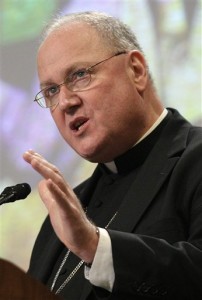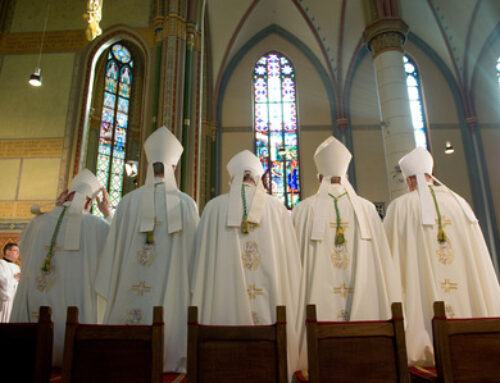 A couple of months ago my essay American Catholics and Social Justice was published here. It traced the dramatic changes in the hierarchy’s perspective on social justice from Pope Leo XIII to the present, with particular emphasis on the views of the U.S. Conference of Catholic Bishops.
A couple of months ago my essay American Catholics and Social Justice was published here. It traced the dramatic changes in the hierarchy’s perspective on social justice from Pope Leo XIII to the present, with particular emphasis on the views of the U.S. Conference of Catholic Bishops.
Since then the bishops have led the legal response to the Obama Administration’s attack on the religious freedom of Catholics.
Given that this is an election year and Catholics represent more than a quarter of the electorate, some people are wondering why the President ran the risk of alienating Catholic voters.
My guess is that there were two reasons. First, that the President thought the bishops were malleable enough to accept having to pay for their employees’ contraception expenses, even though doing so violated Church doctrine. After all, he knew they had supported a number of “progressive” initiatives, including the Affordable Housing Act, the Stimulus Plan, climate change initiatives, and the expansion of various federal programs. Secondly, the President no doubt knew that a majority of Catholics practice artificial birth control and, more importantly, that most American bishops have tacitly approved the practice for more than forty years.
Anyone who doubts this tacit approval need only consider why most Catholic pulpits have been silent on the subject for all those decades. Was it because bishops failed to notice that the number of children in the pews was dwindling more each year? (The average number of children in Catholic families today is not much greater than the national average of 1.9.) Or was it because the bishops assumed that the “rhythm” method of birth control had magically become efficacious? Neither explanation is plausible. Besides, even if the bishops were that naive, they would at very least have advised their priests, “Next time you urge the faithful to pray for vocations, work in a little encouragement to forego ‘rhythm’ and nudge the birth rate.”
The real reason that many (most?) American bishops have ignored the official Church teaching on contraception is that they disagree with it, a fact that their loyalty to Rome prevents them from making public. They have instead directed their intellectual energies to championing the Church’s teaching on abortion, a position they support.
In any case, the Obama administration’s miscalculation about the bishops’ malleability was offset by the bishops’ vulnerability on contraception. Accordingly, when the bishops argued that the issue in question is the constitutional right of religious institutions to practice their faith free from government coercion (an accurate assessment), the administration deviously shifted public attention to the irrelevant issue of contraception, thereby triggering liberal Catholics’ fear of clerical violation of their bedroom privacy.
Dishonest though it was, the Obama administration’s tactic had the odds in its favor. Fifty-four percent of Catholics voted for Barack Obama in 2008, even though it was no secret that his views were at odds with Catholic moral teachings. Moreover, according to a Public Religion Research poll, 58% of all Catholics share the President’s belief that all health care plans should cover contraception. The Catholic Health Association, speaking for hundreds of Catholic hospitals, has also embraced that view, as have a number of Catholic colleges and universities. In fact, some Catholic institutions already include contraceptive coverage, notably Georgetown, Fordham, and DePaul universities.
The challenge facing the bishops is how to persuade liberal Catholics that the issue is not whether contraception is moral or immoral but, instead, whether government should be able to coerce religious institutions to violate their beliefs. The surest way to win over liberal Catholics would be for the bishops to say publicly, “We are not opposed to artificial birth control. Instead, we believe it can be a moral choice for married couples.” Such a pronouncement would instantly undercut the administration’s attempt to change the discussion.
The bishops’ dilemma is that, even though they might personally believe that artificial birth control is morally acceptable, they cannot say so publicly without putting themselves formally at odds with Rome, losing credibility with conservative Catholics, and widening the existing schism on the issue of contraception. Besides, the issue is not as simple as popular discourse would suggest, and relatively few of the bishops are moral theologians.
For now, the bishops, and all who share their concern about government coercion, will have to hope that honest argumentation about the real issue will be sufficient to overcome the administration’s fear-mongering.
Copyright © 2012 by Vincent Ryan Ruggiero. All rights reserved



